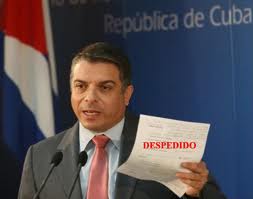
“Hidden Declaration in a Lighter”
by Pablo Pacheco Avila
After the success of the hunger strike, we began to elaborate a plan to confront the ex-Minister of Exterior Relations, Felipe Perez Roque. The lies he had told the national and foreign press about the existence of services for political prisoners were about to be proved false by us prisoners.
The control exercised over the prisoners in each of the corners of “The Polish” seemed to be never ending. Common prisoners would actually give us ideas on how to clandestinely send out notes for the press. Some would do it out of genuine solidarity while others actually did so in order to later denounce us to the authorities, gaining their share of benefits.
Roberto Pinto Perez, a common prisoner from Villa Clara province who was sentenced to more than 40 years of prison for serious crimes, suggested we hide the notes by attaching them to the soles of our shoes. Manuel Ubals failed at the attempt and suffered a few days of punishment for it. Yosbany, a prisoner from Camaguey condemned to a life sentence for murdering a soldier at his local jail, suggested we hide the note in the hem of our pants. We failed at that as well. Lastly, the prisoner Yoexis Rodriguez Sarmiento, from Cienfuegos and with a 46 year sentence for homicide and other violent crimes, told us we should be astute, for the police had 8 hours to watch us and we had 24 hours to think.
On the day before the family visit of Alexis, he wrote us a letter where he said that bringing the note out would be his responsibility. For security measures, and to avoid the guards snatching the note from us, he did not give much details on how he would go about doing this. And we understood him. Solitary confinement trains you to see unexpected and imaginative paths. We realized this with time and carried it out with many good results.
When Alexis returned from his visit, he wrote us another letter saying that the declaration would be made public as soon as his wife, Luisa Maria Lebeque Gilart, arrived to Santiago de Cuba. We were not expecting any of this. He wrote down the declaration and he folded it so small that he managed to hide it inside a “Cliper”-brand lighter. When the guards searched him and asked him about the lighter he told them he was giving it to his wife so she could re-fill it. Fortunately, the guards could not imagine that in such an innocent lighter there was a note denouncing crimes committed by them and the government they represent.
Two days later, the world knew that the words of Felipe Perez Roque were lies dressed with cynicism and bad intentions.
Soon thereafter, common prisoners carried out their own subtle investigations about how we were able to surpass the guards and get the note out. Luckily, we had already grown accustomed to such indigent attitudes, and they never found out how we overcame the fierce censorship of the authorities.
Weeks later, we were very surprised by the progress of the jail services. For the first time ever we were given 5 minutes of telephone time to talk with our wives or relatives. Medical assistance increased. Letters finally started getting to our hands. Our food was being prepared with more quality, and they lent us some books from the penal library.
The accusations worked, and common prisoners also benefited. In order to not acknowledge our victory, police guards extended the assistance to common prisoners and we were happy about that, for not only are they also humans, but we had won their support.
During one afternoon we noticed that one of the guards had tuned into Radio Marti by mistake. This is a station which is located in South Florida and which broadcasts to Cuba. It became the voice of those who least have voices on the island: peaceful dissidents, independent journalists, and human rights activists.
I was very surprised when I heard the voice of Jose Luis Ramos, a reporter from that station, reporting some news about my mother. We quickly noticed and we all remained silent until the news report concluded. We then spoke about what just had happened and continued listening to other news. Upon hearing our comments, the convict Raidel Casanova called the guard and told him he was listening to a counter-revolutionary station and that if he did not change it he would tell the State Security officials.
Taken by surprise, the guard quickly turned the radio off. But he could not extinguish the happiness we felt for having lived those quick moments of freedom. Many other common prisoners hurled insults to Raidel. His attitude confirmed our suspicions about him being an informant. Luckily, similar experiences with the radio kept happening every once in a while, seeing as Matanzas and South Florida are very close in location to each other. Despite all the interferences the Cuban authorities have tried against that station, the signal would reach us with clarity.
In addition to the family and conjugal visits, listening to Radio Marti, even if just for a few minutes, moved me away from loneliness and misinformation. They were glimmers of freedom during moments of gloom and they inspired me to continue down the path I had chosen. For this reason, among others, the cross I carried was made less heavy and the taste of imprisonment was less bitter.
March 28, 2011
